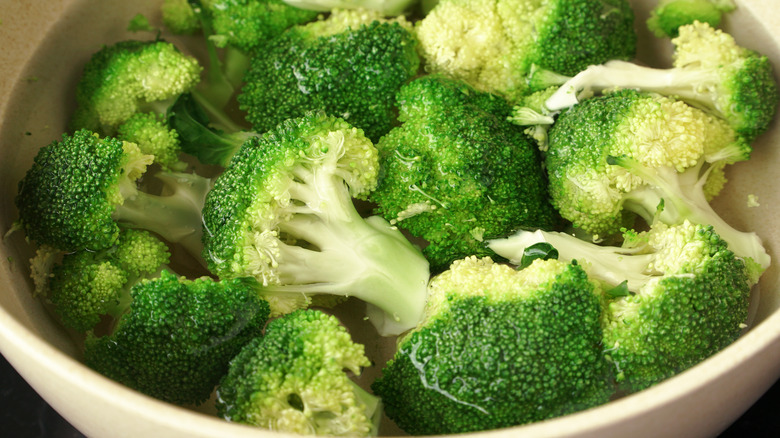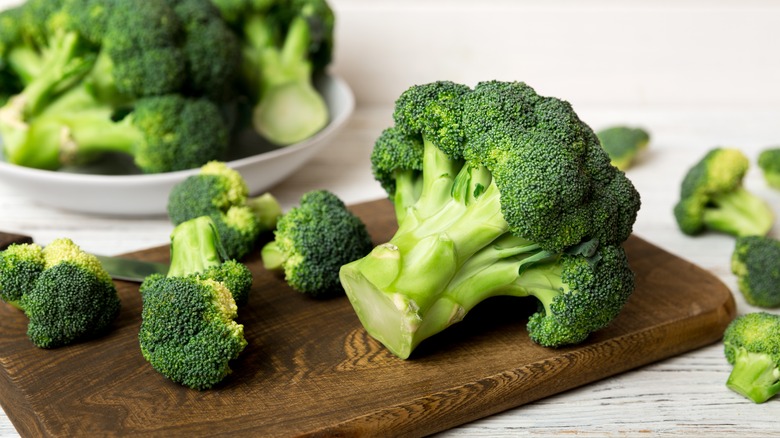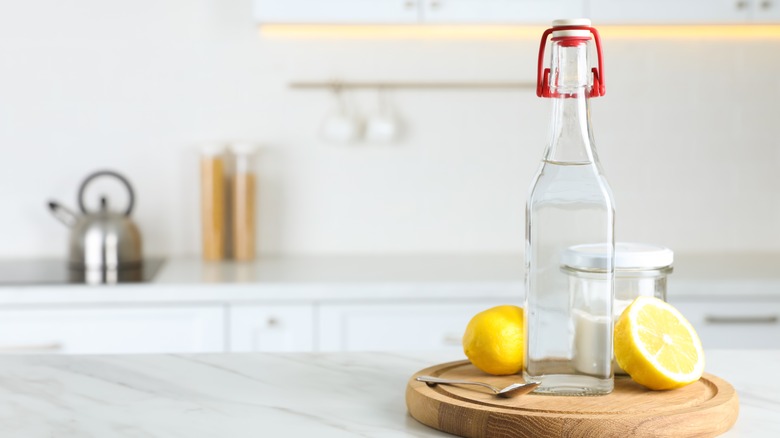How To Deep Clean Broccoli With Water And Vinegar
Densely-packed vegetables like cauliflower and broccoli have tons of nooks and crannies, which might make you feel like they need a deeper wash. You can't always see what's lurking between the stalks of each floret. If you're wary about germs, pesticides, and small critters like aphids, and a quick wash under running water just doesn't seem enough, all you need is a solution of vinegar and water.
A vinegar soak can give broccoli a deeper, more thorough cleaning job. Fill a bowl with a 3:1 ratio of water (either cold or warm works) and white vinegar. Soak the broccoli in the solution for about two minutes, then rinse it with fresh water to get rid of any traces of vinegar. If you're not going to cook it straight away, make sure to dry the broccoli properly before you go ahead and store it in the fridge. You wouldn't want any lingering drops of water making the florets damp, mushy, and moldy.
How to prep your broccoli for a deep clean
Before going ahead and soaking the broccoli in a vinegar solution, it's important to prep it first. Though hacks from social media will tell you that holding a head of broccoli upside down under running water is enough, you should actually chop broccoli into smaller florets before washing it. This will help you really get into those dense crevices as you rub away any muck, germs, and bugs (if any) with your fingers. Cut an inch off the bottom of the stem of the broccoli and break up the veggie into smaller florets, discarding any leaves or tough bits along the way. Look for any bruised or wilted parts and remove those, too.
Next, put the florets in a colander and give them a quick rinse under running tap water. The water will get rid of any major dirt, debris, and muck, leaving the broccoli ready for a deeper clean. But before you prepare your vinegar solution, you may wonder about its specific benefits. Does vinegar really clean broccoli better than water can? In some ways, yes.
The benefits of using vinegar
Broccoli is nowhere near the most pesticide-ridden piece of produce you can buy (that spot is taken by strawberries). However, in the Environmental Working Group's ranking of 46 fruits and veggies based on their pesticide residue, broccoli falls in the middle — neither the "cleanest" nor the least clean. So if you're concerned about pesticides, can vinegar do a better cleaning job than plain old water?
Research by Tennessee State University's Institute of Agricultural and Environmental Sciences found that rinsing and soaking produce in water can get rid of 98% of bacteria present (via NPR). However, another test conducted by Cook's Illustrated found that vinegar did the same, and also has an extra advantage. Vinegar can get rid of pesticides and microbes present in broccoli, and it can also kill most germs and bacteria. Its big edge over water is preservation — vinegar's acidic nature that can keep broccoli fresh for longer.
Vinegar has long been a favored liquid for preserving foods, such as in pickling and fermenting. When used to rinse vegetables like broccoli, vinegar slows the rate at which the produce decomposes, increasing their shelf lives. Plus, vinegar is a perfectly safe cleaning solution to use on foods, which is more than what can be said of soaps, detergents, and commercial cleaning solutions. So even though a vinegar water soak adds a few minutes to your broccoli-washing routine, it may very well be worth the extra effort.



